Huitong.com June 21st - Wednesday (June 21) US dollar index broke away from a one-month high, as oil prices fell to suppress US bond yields, the pound against the US dollar faltered, after Bank of England Governor Carney blew the British rise Hope. After rejecting A shares for three consecutive years, US index company MSCI has finally included A shares in its global emerging market index, and A shares fluctuated. The increase in supply in several key oil-producing countries has overshadowed the impact of higher implementation rates of OPEC and non-OPEC oil-producing countries. Oil prices are under pressure and investors are waiting for EIA crude oil data guidance. Spot gold is still not far from the five-week low. 
☆Review of foreign exchange market in Asia: The dollar is out of a one-month high, and the pound is stuck in a two-month low ☆
The dollar index volatility trading at around 97.75, on Tuesday (June 20) after hitting a one-month high 97.87, last week after the Federal Reserve to raise interest rates in 2017 will again raise interest rates encourage dollar bulls.
However, the rebound in the yield of US Treasury bonds could stop overnight, and the dollar’s ​​gains stagnate.
US 10-year bond yields fell sharply following the decline in oil prices on Tuesday, reversing most of the gains the Fed recorded after opening the door to another rate hike this year.
Junichi Ishikawa, senior currency strategist at IG Securities in Tokyo, said that the decline in oil prices has weakened inflationary pressures, which in turn has prevented US yields from rising. The first is that the US inflation indicator has not been strong enough. The current drop in oil prices will weaken confidence in the US energy industry and put more pressure on the dollar. 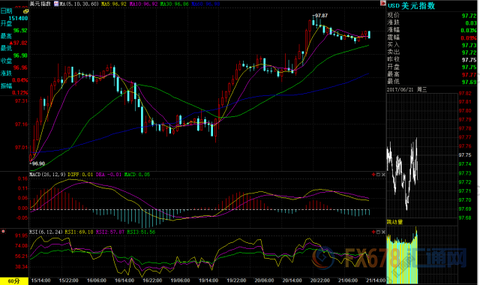
US dollar against the yen in volatile trading above the 111 mark, out of reach of nearly one-month high on Tuesday of 111.790 points. Although the dollar's rise against the yen may have stopped, some people expect the downtrend to be limited, and the dollar against the yen is expected to resume its uptrend.
Masashi Murata, senior currency strategist at Brown Brothers Harriman in Tokyo, said that the dollar may not be very popular, but given the low interest rate policy of the European Central Bank and the Bank of Japan, market participants have no strong incentive to buy yen or euro, given US stocks. Holding the record high, the Fed seems to decide to raise interest rates, and the market is unlikely to be eager to make a negative judgement against the United States. 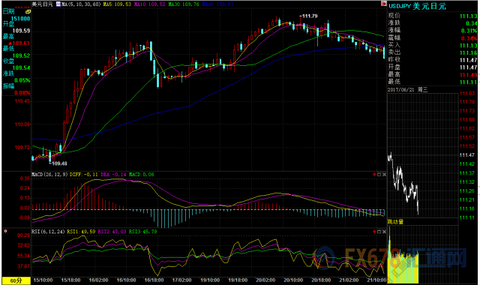
The pound has remained unchanged against the dollar and is now trading near 1.2610, still not far from the two-month low.
Bank of England Governor Carney said on Tuesday that it is not the time to raise interest rates. At the Bank of England meeting last week, three of the eight monetary policy members voted to raise interest rates, raising hopes for the bank's recent tightening policy.
Commodity-related currencies were also on the defensive, and overnight oil prices were hit by oversupply concerns, falling to a nine-month low. Affected by the weakening of oil prices, the US dollar against the Canadian dollar fell about 0.35% overnight , is now trading near 1.3277, further away from the three-and-a-half-month high of 1.3165, when the Bank of Canada governor has expressed support for interest rate hikes.
☆ Crude oil futures: Investors pay attention to US EIA crude oil inventory data ☆
US crude oil August futures traded near $43.45/barrel, and Brent crude oil futures traded near $45.88/barrel. Due to the drag of technical selling, the overnight oil price once fell 3% . The decline in API crude oil inventories has also failed to save oil prices, and market analysts have been bearish on oil prices. At present, the market sentiment sentiment tends to be cautious, and the market is currently waiting for the US EIA crude oil inventory report to be released in the evening.
The decline in API crude oil inventories failed to boost oil prices. The well-known financial blog zero-hedged commentary said that with US crude oil hitting a seven-month low, crude oil bulls hope that API data can boost oil price rebound; however, although API crude oil inventories fell more than expected However, the inventory of gasoline and refined oil increased significantly, so the oil price fell after the data was released shortly after the announcement.
Since the end of May, OPEC, Russia and other oil-producing countries have agreed to extend the production restriction agreement to more than 15% since March 2018.
Gene McGillian, market research manager at Tradition Energy, said that taking into account expectations of higher production levels in several regions around the world would offset all reduced production.
According to sources, in May, the implementation rate of OPEC and non-OPEC oil-producing countries was 106%, the highest level since the agreement was reached last year.
At 22:30 Beijing time on Wednesday (June 21), the EIA crude oil inventory report for the week ending June 16 will be announced. Investors should pay close attention.
The market expects US EIA crude oil inventories to decrease by 1.011 million barrels, Cushing crude oil inventories to decrease by 439,500 barrels, gasoline inventories to increase by 346,600 barrels, and refined oil inventories to increase by 735,700 barrels. 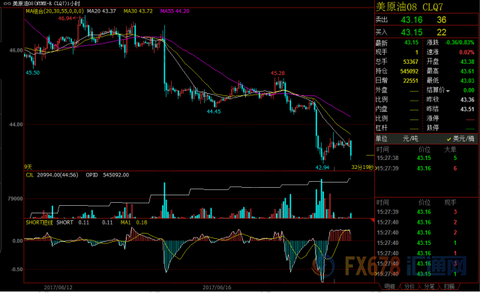
☆Stock market: A-share customs clearance MSCI opened higher after the first day of the volatility ☆
After rejecting A shares for three consecutive years, on June 21, Beijing time, US index company MSCI Ming Hao finally included A shares in its global emerging market index, which may promote asset management managers, pension managers and Insurers will invest as much as $400 billion in Chinese stocks over the next decade.
Goldman Sachs analyst Liu Jinjin said that due to the inclusion of the MSCI index in China's A-shares, the weights of the Korea, Taiwan, and India stock benchmark indices may be significantly diluted. Accordingly, this could mean a net sell-off of up to $1.8 billion, $1.4 billion, and $1 billion, respectively.
In the next five years, China's A-shares will account for 9% of the MSCI Emerging Markets Index and 1% of the MSCI Global Index, bringing about $230 billion in index investment capital. After June 2018, A shares will account for 2.6% of the MSCI China Index, 0.7% of the MSCI Asia Index except Japan, and 0.7% of the Emerging Markets Index. The inclusion of the current form may result in a net purchase of $12 billion for 222 A shares by emerging market funds.
Luke Oliver, head of the ETF Capital Markets at Deutsche Asset Management in the Americas, said that the inclusion of A shares would be well-organized in the industry, so this would be a slow process. This result is a bit surprising, but it does not seriously deviate from our estimates.
The Shanghai Composite Index closed up 0.52% on Wednesday, up 16.18 points to 3,516.19 points;
Shenzhen Composite Index closed up 0.70% on Wednesday, rising 72.57 points to 10361.10 points;
The Shanghai and Shenzhen 300 stock indexes closed up 1.14% on Wednesday, up 40.34 points to 3,568.83 points;
The GEM index closed up 0.18% on Wednesday, rising 3.23 points to 1824.21 points.
South Korea's Seoul Composite Index closed down 0.49% on Wednesday at 2357.50.
The Nikkei 225 index closed down 0.45% on Wednesday, at 20138.79 points;
Japan's Dongzheng stock price index closed down 0.35% on Wednesday, at 1611.56 points.
The Australian stock market index S&P/ASX200 index closed down 1.44% on Wednesday, at 5674.10 points. 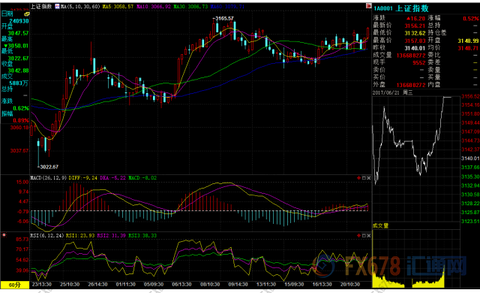
☆ Precious metals: Spot gold is still not far from the five-week low ☆
Spot gold is currently trading at around $1,245 per ounce, not far from the five-week low of 1240.80, mainly due to the strength of the US dollar. After many Fed officials issued speeches, clear expectations of interest rate hikes and contraction during the year, which supports the US dollar Pressing the price of gold.
New York Fed President and Federal Reserve No. 3 Dudley said on Monday that he believes that the US economic outlook is "quite good" and that investors' interpretation of this statement is that it supports the Fed's recent monetary policy normalization action.
In addition, the Fed's two voting committees, Chicago Fed President Evans and Dallas Fed President Kaplan issued a relatively neutral statement, although they are optimistic about the US economic outlook, but they also expressed a cautious view on the recent decline in inflation.
Natixis analyst Bernard Dahdah said, "It is not entirely impossible for the Fed to raise interest rates again. From now until the end of the year, the price of gold may fall slightly, especially if the European Central Bank starts to gradually reduce the scale of public debt purchases, except for the Fed rate hike. May be under more pressure." 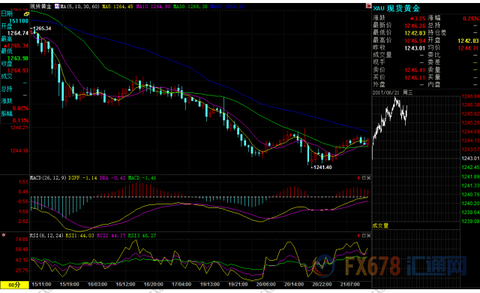
Huitong Finance and Economics Huihui market software shows that the Beijing dollar index was 97.74/75 at 15:31 Beijing time.
Work Socks,Mens Thick Work Socks,Mens Crew Work Socks,Working Casual Polyester Socks
Jingjiang Pingdong Import&Export Co.,Ltd , https://www.jingjiangsocks.com